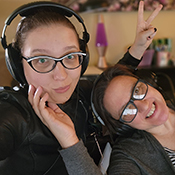By Heather McNamara
 Have you ever looked at an object and forgotten what it was called? Maybe you’ve been in the produce section of a grocery store, standing in front of the pineapples and found yourself thinking “Banana? Mango?” I have. In fact, as a stroke survivor and anxiety/depression sufferer, these moments occur more often than I’d like to admit. Sometimes, alternative suggestions don’t even come up. I can stare at an ordinary object for a full minute without a single clue as to what it’s called. I can say from experience that the seconds in that minute are very, very long as the situation gradually transforms from a humorous anecdote to an inconvenience to something I might Google later and finally something I know I need to talk to my doctor about. I often wonder: Do I not have the words at all? Will they come back? Will I be okay or will I eventually lose my ability to work and function in society altogether?
Have you ever looked at an object and forgotten what it was called? Maybe you’ve been in the produce section of a grocery store, standing in front of the pineapples and found yourself thinking “Banana? Mango?” I have. In fact, as a stroke survivor and anxiety/depression sufferer, these moments occur more often than I’d like to admit. Sometimes, alternative suggestions don’t even come up. I can stare at an ordinary object for a full minute without a single clue as to what it’s called. I can say from experience that the seconds in that minute are very, very long as the situation gradually transforms from a humorous anecdote to an inconvenience to something I might Google later and finally something I know I need to talk to my doctor about. I often wonder: Do I not have the words at all? Will they come back? Will I be okay or will I eventually lose my ability to work and function in society altogether?
This is a small part of the distressing experience of subjective cognitive decline, or SCD. A self-reported loss of executive function or memory and trouble thinking are the typical presenting symptoms (Flatt et al., 2018). It’s an experience I’m familiar with and, lately at least, I’m not alone. Since the beginning of the COVID-19 pandemic, SCD (or “brain fog” in common parlance) has become the norm. In fact, article after article these days seems to ask the same questions: are you newly having trouble thinking? Remembering things? The answer is easy: The crushing weight of an increasingly dangerous world has got you down. This is normal and you’re not alone.
So when it comes to individuals who live under constant minority threat in a culture that is always dangerous and always unfriendly to them, it should be no surprise that SCD is seen at higher rates. You may have come across a rather alarming Medscape article earlier this month entitled “‘Alarming’ Data on Early Cognitive Decline in Transgender Adults”, which begins with a misleading claim about what SCD indicates:
SCD is a self-reported experience of worsening memory or thinking and is one of the first clinical manifestations of Alzheimer’s disease and related dementia (ADRD).
The same condition that is currently plaguing cisgender heterosexual people all over the world becomes very “alarming” when it applies to LGBT adults. Articles about SCD that assume their audiences are cisgender heterosexuals take a more calming approach, while this one frets about how transgender adults are sure to develop Alzheimer’s.
While Medscape plays to the fears of LGBT people and their loved ones and bets on the click-producing drama of their headline, the truth of the matter needn’t be nearly so dire. In a recent study of older trans women who had taken HRT for at least 10 years, any differences in cognitive functioning compared to cis men and cis women controls were found to be “small”, suggesting that any effects from HRT on cognition are “minimal” (van Heesewijk et al., 2021). Several studies have explored the link between SCD and objective cognitive impairment, or OCI, and have found that while SCD can precede OCI, it more often indicates a current battle with the more treatable mood disorder known as depression (Flatt et al., 2018):
Zlatar and colleagues found that SCD was not associated with objective cognitive function after controlling for depression, and only depression was significantly associated with SCD after accounting for demographics, physical functioning, and objective cognitive function.
If anything, the alarming truth of the matter is that LGB and especially T people experience barriers to care that the cisgender, heterosexual population does not. Like all minorities, we more often experience difficulty getting work, finding medical professionals that take us seriously, and finding supportive and safe communities.
The COVID pandemic has dissolved modern social interaction into the experience of an LGBT person writ large. Now we all stay inside bubbles to remain safe. We all take precautions when we go into public. We all find communities online and we are all at increased risk when members of a certain political affiliation decide their personal comfort is more important than our safety.
Hope is a motivator to seek care, but what is a doctor going to do about the current state of society? A doctor cannot write a prescription to end a pandemic any more than they can scribble away transphobia and homophobia. And so we are all currently wandering around the produce aisle, trying to find the names for pineapples. ■



